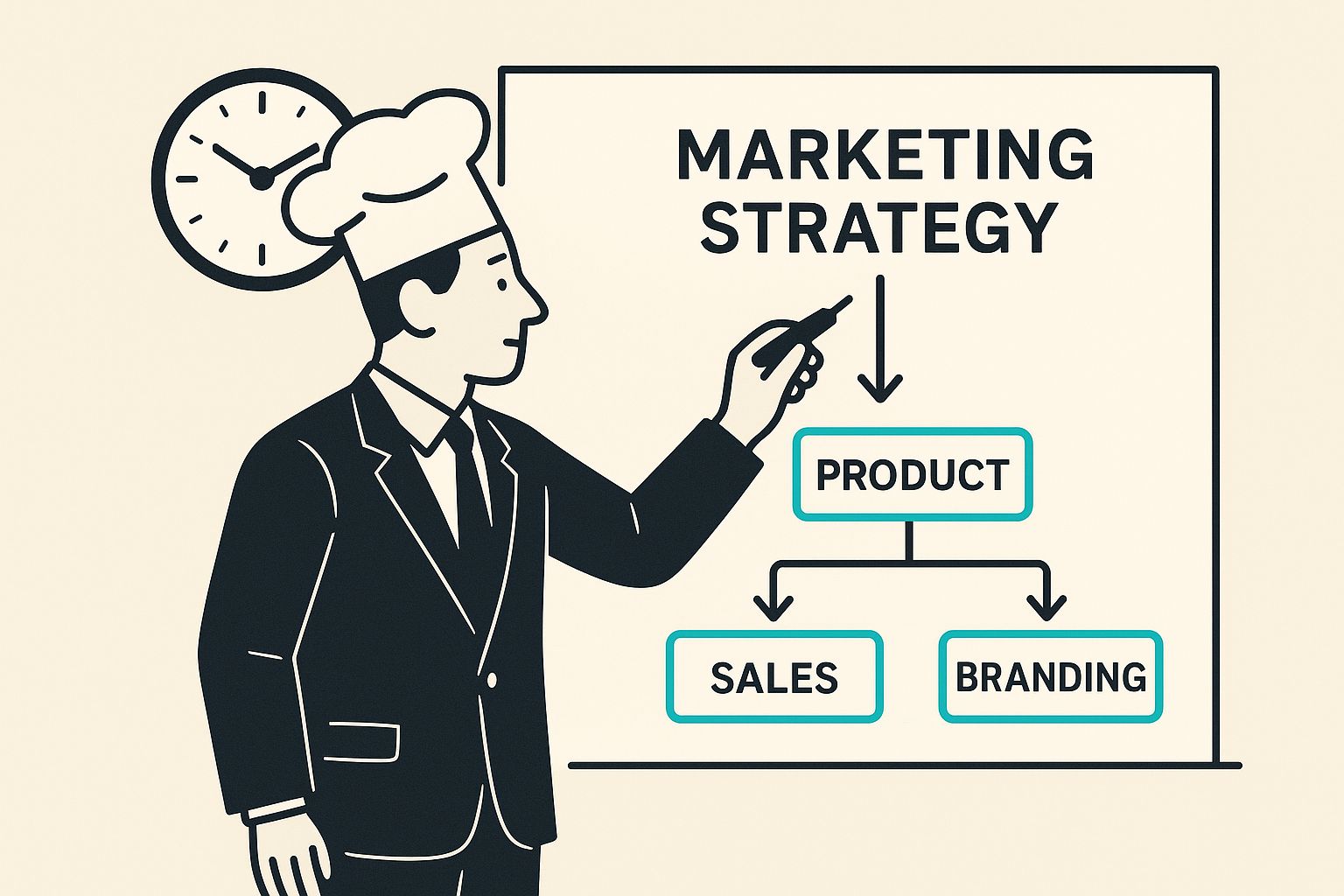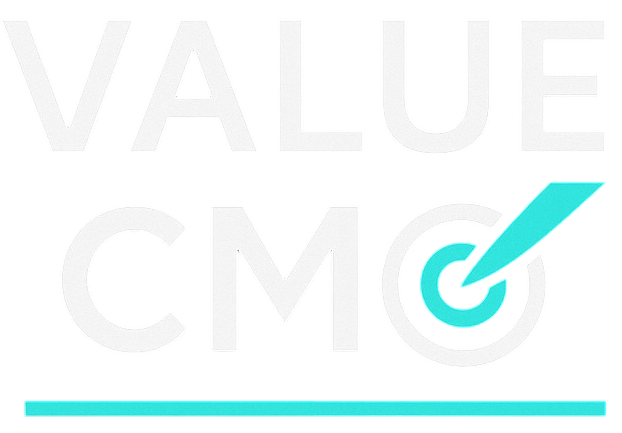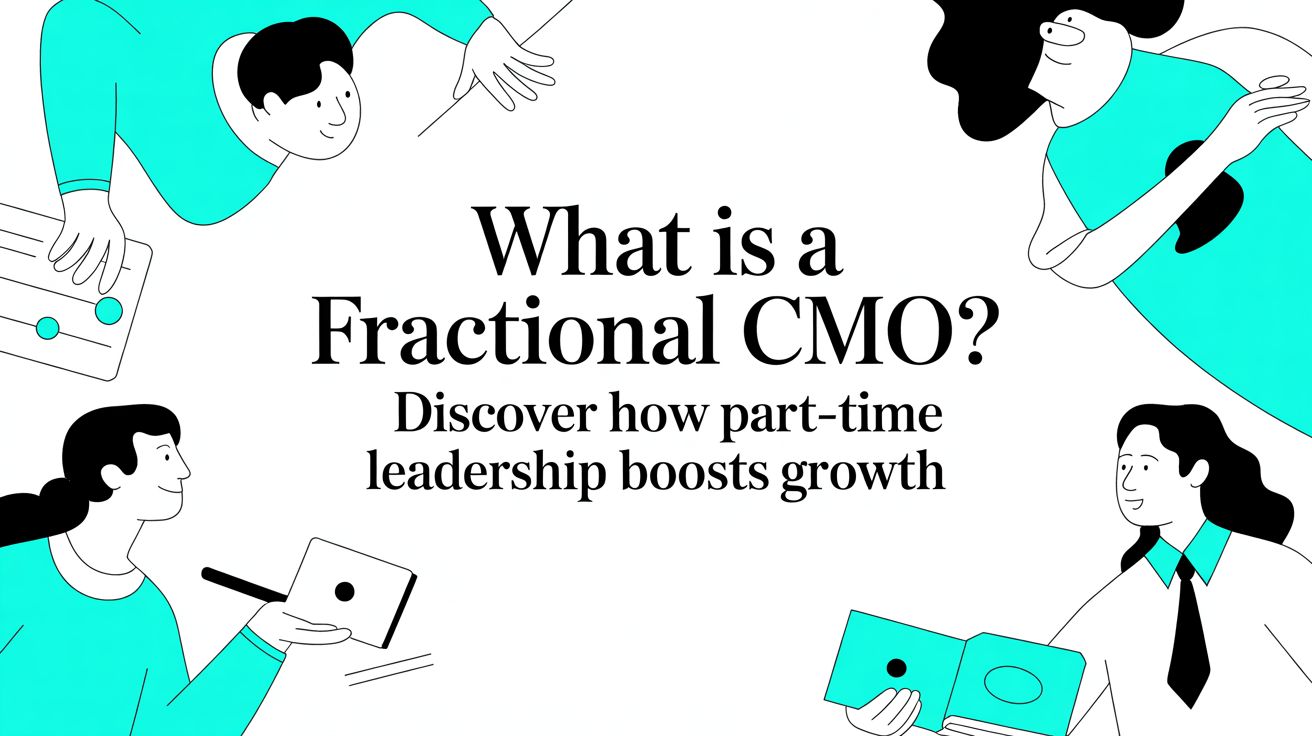Ever found yourself needing a full-time executive’s brain on a startup’s budget? It’s a classic catch-22, and one that trips up a lot of founders.
Think of it this way: you wouldn’t hire a full-time, six-figure chef just to design the menu for your new café. You’d bring in an expert to create the vision, train your team, and set the standard for success—then let your crew run the kitchen.
A fractional Chief Marketing Officer (CMO) is that expert chef for your marketing. They bring C-suite strategy and battle-tested leadership to your business on a part-time basis, giving you the recipe for growth without the full-time executive cost.
What Is a Fractional CMO Anyway?
Let’s get practical. A fractional CMO isn’t just another consultant who drops off a 50-page strategy deck and then vanishes. They actually become a genuine, integrated part of your leadership team, but for a fraction of the time and cost.
Think of them as a strategic partner who rolls up their sleeves, takes real ownership of your marketing goals, and actually steers the ship. This model is a total game-changer for B2B tech companies that desperately need high-level direction but can’t yet justify a full-time executive salary. A fractional CMO is the perfect bridge for that critical gap.
This infographic breaks down how a fractional CMO delivers high-level strategy with part-time efficiency.

The key takeaway? Their role is defined by the impact they make, not the hours they log. It’s about getting top-tier talent working on your business, smartly and efficiently.
More Than Just a Consultant
It’s really important to draw a line between a fractional executive and your typical consultant. While both bring expertise to the table, their commitment and role are worlds apart.
A fractional Chief Marketing Officer (CMO) is a senior marketing executive who provides strategic leadership on a part-time or contract basis, usually working one to three days a week for growing companies.
Their job isn’t just to advise; it’s to lead. This usually includes:
- Building a marketing strategy that ties directly to your revenue goals.
- Leading and mentoring your existing marketing team, helping them level up their skills.
- Owning the marketing budget to make sure every dollar is working hard for you.
- Overseeing campaigns and key initiatives, from the initial idea to the final performance report.
A fractional CMO doesn’t just give you a map; they get in the car and help you drive. They’re accountable for the results, sharing the risks and rewards as a true member of your executive team.
This model provides the structure and accountability you need to turn random marketing activities into a predictable growth engine. You can get a deeper look at the mechanics in our complete outsourced marketing guide for 2025.
By embedding themselves in your operations, a fractional CMO ensures marketing becomes a focused, data-driven function designed to hit specific business outcomes.
Fractional CMO vs Full-Time CMO At a Glance
So, when you’re weighing your options, what are the real differences? This table cuts straight to the point, comparing the two roles on the things that matter most to a growing business.
| Attribute | Fractional CMO | Full-Time CMO |
|---|---|---|
| Commitment | Part-time (typically 10-20 hours/week) | Full-time (40+ hours/week) |
| Cost | Lower, fixed monthly retainer | High salary, plus benefits, bonus, and equity |
| Focus | High-level strategy, team leadership, budget oversight | Day-to-day management and strategic leadership |
| Flexibility | High; can scale up or down as needed | Low; long-term employment contract |
| Onboarding | Fast; typically onboarded in weeks | Slower; often a multi-month hiring process |
| Best Fit For | Startups, scale-ups, and SMEs needing strategic direction | Established companies needing full-time leadership |
The right choice really comes down to your company’s stage and immediate needs. A fractional CMO gives you access to top-tier strategic talent without the hefty price tag and long-term commitment of a full-time hire, making it a powerful option for businesses ready to scale smart.
The Real Impact of a Fractional CMO on Your Business
Knowing what a fractional CMO is is the first step. But the real question is, what do they actually do? Forget the slide decks and endless meetings for a second. Their true value is in turning your marketing from a cost center into a predictable growth engine.

Think of them less as a part-time leader and more as a force multiplier. They don’t just bring their own skills to the table; they elevate the output of your entire team. It’s an impact that sticks around long after their contract ends.
Ending Random Acts of Marketing
So many growing businesses suffer from what I call “random acts of marketing.” You know the drill: the team is busy running campaigns, posting on social media, and sending out emails, but nothing really connects. There’s no cohesive strategy holding it all together, and the result is a lot of wasted effort and a flat growth curve.
A fractional CMO’s first job is to stop the chaos. They install proven, repeatable systems that bring order to your marketing efforts. Every action becomes deliberate. Every dollar gets invested with a clear purpose.
For instance, instead of just “doing content,” they build a content engine that directly fuels sales and generates qualified leads. Instead of running ads on a whim, they create a demand generation framework tied to specific pipeline goals. It’s a fundamental shift from being busy to being effective.
A great fractional CMO transforms your marketing from a collection of disjointed tactics into a finely tuned machine built for one thing: generating revenue. Their outside perspective is often the spark needed to break through those frustrating growth plateaus.
This disciplined approach ensures that as your business scales, your marketing scales right along with it.
Mentoring Your Team and Building Capacity
One of the most valuable—and often overlooked—roles of a fractional CMO is that of a mentor. They provide the senior-level leadership that junior marketers are craving to level up. By working right alongside your team, they transfer knowledge, teach best practices, and build real confidence.
This hands-on coaching creates a powerful ripple effect:
- Elevates Skills: Junior team members learn how to think strategically, analyze data, and own projects from start to finish.
- Improves Retention: Marketers who feel supported and see a clear path for growth are far more likely to stick around.
- Creates Future Leaders: They help groom your existing talent, often identifying and preparing your next full-time marketing director or VP.
This focus on team development means you’re not just renting a strategist; you’re investing in the long-term strength of your in-house marketing team.
Directly Aligning Marketing with Revenue
Ultimately, the most critical impact of a fractional CMO is their relentless focus on the bottom line. They exist to bridge that all-too-common gap between marketing activities and real business results.
They speak the language of the C-suite—metrics like Customer Acquisition Cost (CAC), Lifetime Value (LTV), and pipeline velocity.
This alignment ensures marketing is never just about vanity metrics like brand awareness or lead volume. It’s about creating measurable economic value. Studies show that companies with tight marketing and sales alignment achieve 20% faster revenue growth annually. A fractional CMO is the architect of that alignment, making sure every single campaign contributes directly to your biggest financial goals.
Key Signs You Need to Hire a Fractional CMO
Recognizing you need high-level marketing help is the first step to breaking out of a growth stall. Many founders know the feeling: the marketing engine is running, but it feels like it’s stuck in first gear. How do you know if a fractional CMO is the missing piece?

It usually boils down to a few critical pain points that all point to a strategy gap. If you find yourself nodding along to any of these, it’s probably time to bring in senior marketing leadership.
Your Marketing Spend Feels Like a Guessing Game
Are you pumping money into different channels but have no real clue what the return is? This is one of the biggest red flags. When your budget feels more like an expense than an investment, it’s a sure sign your marketing is missing a data-driven strategy.
A fractional CMO connects the dots. They don’t just throw budget around; they build a financial model for your marketing, making sure every dollar is tied to a specific, measurable goal like hitting a lead target or driving down customer acquisition cost.
You’re spending, but you can’t confidently tell your board what’s working, what isn’t, and why. A fractional CMO’s first job is to replace that uncertainty with a predictable growth plan.
This kind of strategic oversight turns marketing from a source of financial anxiety into a genuine revenue driver.
Your Team Is Great at Tasks But Lacks Direction
You might have a solid team of marketers—a great content writer, a sharp digital ads specialist, and a social media whiz. They’re excellent at executing, but without a unified strategy, their efforts are scattered and don’t deliver the punch they should. They need a leader to orchestrate their talents toward a common goal.
Here are a few signs your team is missing that senior leadership:
- They’re busy with “random acts of marketing” that don’t connect to a bigger picture.
- They lack clear priorities, leading to burnout or time spent on low-impact work.
- They need constant direction from the CEO, who’s already stretched way too thin.
A fractional CMO provides that crucial leadership layer. They mentor your team and make sure all that hard work actually translates into business results.
Your CEO Has Become the Reluctant Head of Marketing
For a lot of founders, marketing leadership lands on their shoulders by default. But as the company grows, that just doesn’t scale. If you, as the CEO, are still approving social media copy and setting campaign budgets, you’ve become a major bottleneck.
Your time is far more valuable when spent on product, vision, and fundraising. A fractional CMO takes marketing off your plate, giving you back the headspace to actually lead the company. In fact, this is a classic reason for bringing in outside help. Research shows that about 40% of high-growth startups hire fractional CMOs during key scaling phases, especially when they’re between $5 million and $50 million in revenue.
It lets them get executive-level strategy without the full-time commitment too early. You can hear more about the financial impact of fractional CMOs on The Investor’s Podcast.
Let’s Talk Numbers: The Cost of a Fractional CMO
Okay, let’s get right to it. The first question everyone asks is: “What does a fractional CMO actually cost?” The short answer is that the entire model is built to give you C-suite marketing leadership without the staggering expense of a full-time executive hire.
Think about it this way: you’re not taking on a massive salary plus benefits, bonuses, and equity. You’re just paying for strategic output. This makes the total investment far more predictable and manageable for a B2B tech startup where every single dollar has to count.
Common Pricing Models and Ranges
Most fractional CMOs work on a monthly retainer. This isn’t about buying a block of hours; it’s about securing ongoing access to high-level expertise and accountable leadership. You get a strategic partner who’s dedicated to your growth.
While the exact numbers depend on the CMO’s experience and how deep the engagement goes, the structures are pretty straightforward:
- Monthly Retainer: This is the go-to model. It covers ongoing strategy, team leadership, and budget oversight for one flat monthly fee. Simple and predictable.
- Project-Based Fees: Got a specific, one-time goal like a major product launch or cracking a new market? A project-based fee sets a clear scope and a fixed price from day one.
Typically, that monthly retainer will land somewhere between $8,000 and $20,000 per month. The beauty of this model is its flexibility—you can scale the engagement up or down as your needs evolve, ensuring you’re never overpaying for services you don’t need.
Comparing Costs: Full-Time vs. Fractional
To really see the value, you have to stack the numbers up against a full-time hire. It’s not just the base salary; a full-time CMO comes with a ton of extra costs that add up incredibly fast.
The real power of the fractional model is its financial leverage. You get the strategic mind of a seasoned executive focused on your most critical growth levers, all for a fraction of the cost of a traditional hire.
A full-time CMO in a place like Silicon Valley can easily pull a total compensation package north of $400,000 annually when you factor in cash and stock options. A fractional CMO, on the other hand, delivers that same strategic brainpower for roughly 20–40% of the cost.
This isn’t just about saving money; it’s about smart capital allocation. For a B2B startup, that difference lets you pour significant funds back into product development, sales, or other core growth areas. We dig deeper into this in our guide on building a lean CEO marketing budget for 2025. It’s a classic ROI-driven decision.
How to Find and Hire the Right Fractional CMO
So you’re sold. A fractional CMO feels like the right move. Now for the hard part: finding the perfect strategic partner for your B2B tech startup.
This isn’t just another hire. You’re bringing a key leader into your inner circle. A bad fit can burn precious time and money, while the right one can completely change your growth trajectory. So, where do you even begin looking?
The good news is that top talent isn’t hiding. You just need to know where to look and what signals to watch for.
Where to Find Top Talent
Finding a seasoned marketing executive means you have to get focused. Forget the generic job boards. You’re looking for specialists who have built their careers on delivering strategic results, not just collecting a paycheck.
Start your search in these high-value places:
- Boutique Agencies and Fractional Firms: Companies like ours specialize in this exact service. We vet the talent and have a roster of experienced leaders with proven track records in specific niches like B2B SaaS.
- Professional Networks like LinkedIn: Get specific. Search for “fractional CMO,” “part-time VP of Marketing,” or “marketing advisor.” Look for profiles that showcase measurable achievements, not just a laundry list of responsibilities.
- Industry Referrals: This is often the best route. Tap into your network of fellow founders, investors, and advisors. A warm intro from someone you trust is gold.
The goal is to find individuals or firms who live and breathe this model. They’re not just experimenting with it; it’s their entire business.
Vetting Your Candidates: A Checklist of Qualities
Once you have a shortlist, how do you separate the true strategists from the career tacticians who just rebranded themselves? It comes down to a specific mix of hard and soft skills that are non-negotiable in a startup environment.
The right fractional CMO doesn’t just bring a playbook; they build one with you. They should feel like a co-founder for your marketing function, deeply invested in your success and unafraid to challenge assumptions.
Here’s what to look for:
- A Data-Driven Mindset: They must speak the language of metrics. Can they talk fluently about CAC, LTV, and pipeline velocity? Ask them to walk you through how they’d build a dashboard to measure marketing’s real impact on revenue.
- Proven Industry Track Record: Look for someone who has successfully scaled a business like yours before. If you’re a B2B SaaS company, a CMO with a brilliant e-commerce background is probably the wrong fit. The context is everything.
- Exceptional Communication Skills: They need to be able to command a room, mentor junior team members, and present a clear, compelling case to your board. Their ability to articulate the strategy is just as important as the strategy itself.
Key Interview Questions to Ask
The interview is your chance to see how they think. Go beyond the standard questions and really dig into their strategic process. The answers will quickly tell you if they have the depth you need.
Here are a few questions designed to test their strategic muscle:
- “Walk me through your first 90 days. What would you prioritize and why?”
- “Describe a time you had to build a marketing strategy from scratch with a limited budget. What were the results?”
- “How do you align marketing goals with sales and overall business objectives?”
- “What is your process for mentoring and developing an in-house marketing team?”
For a deeper dive into making the right executive choice, our complete CMO hiring guide for founders provides even more resources and frameworks. Finding the right fractional CMO is a critical step, and a structured, thoughtful process will ensure you find a partner who can truly help you scale.
A Few Common Questions About Fractional CMOs
Even when the concept makes sense, practical questions always pop up. It’s a big decision, after all. So let’s tackle the ones I hear most often from founders trying to figure out if a fractional CMO is the right move for their B2B tech company.
I’ll keep the answers direct and focused on the real-world concerns you’re likely wrestling with.
What’s the Difference Between a Fractional CMO and a Marketing Consultant?
This one is critical. A marketing consultant is usually brought in to diagnose a specific problem, hand over a strategy deck or a set of recommendations, and then they’re gone. Their job is to advise.
A fractional CMO, on the other hand, rolls up their sleeves and becomes a real part of your leadership team. They don’t just give you a strategy; they own its execution. That means managing your team, controlling the marketing budget, and being accountable for hitting business goals. They’re a true part-time executive, plugged into your day-to-day operations.
Think of it like this: a consultant gives you the recipe. A fractional CMO comes into your kitchen, teaches your team to cook, and makes sure the meal is a success.
How Long Does a Typical Engagement Last?
Most engagements run between six and eighteen months, though there’s always flexibility. That timeframe gives them enough runway to put a solid strategy in motion, build the foundational marketing systems you’re missing, and actually show a measurable impact on growth.
Usually, things kick off with a 90-day plan to lock in some early wins and build momentum. The end goal is often to build a high-performing marketing function that can eventually be handed off to a full-time leader once the company is ready for that level of investment.
Can a Fractional CMO Manage Our Existing Marketing Team?
Absolutely. In fact, that’s a core part of the job and one of their biggest value-adds. A great fractional CMO provides the senior leadership and mentorship that helps your marketing team level up.
Their day-to-day responsibilities usually cover:
- Managing in-house staff to make sure everyone is pulling in the same direction.
- Overseeing agencies and freelancers to get the best performance out of your partners.
- Providing professional development and coaching to grow your team’s skills.
They bring cohesion and strategic direction to the entire function, turning a group of individual contributors into a high-impact team.
What Kind of Results Can We Realistically Expect?
You should expect business results, not just a list of vanity metrics. While they’ll definitely track things like lead volume and conversion rates, the real focus is on outcomes that matter to you, your board, and your bottom line.
Common results include:
- A clear, documented marketing strategy tied directly to revenue.
- A reliable and predictable lead generation engine that keeps the sales pipeline full.
- Improved ROI on your total marketing spend.
- Stronger alignment between your sales and marketing teams (finally).
A high-impact fractional CMO is obsessed with measurable growth. They help you move from guesswork to a data-driven model, building a predictable path to your company’s most important financial goals.
Ready to see what strategic, part-time leadership can do for your B2B tech startup? Value CMO delivers the senior marketing expertise you need to build a focused, data-driven growth roadmap without the full-time executive cost. Learn more and book a call at https://valuecmo.com.

